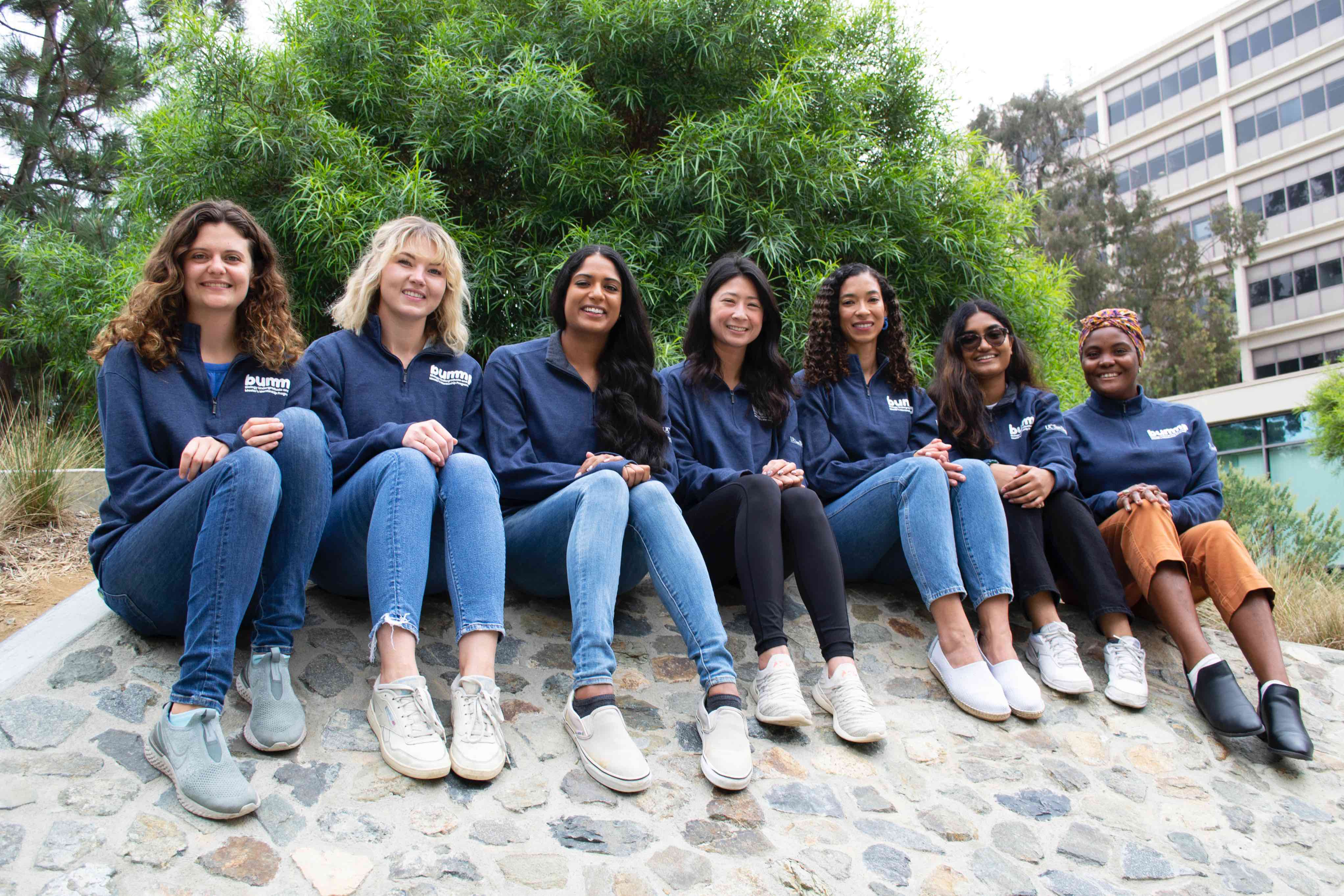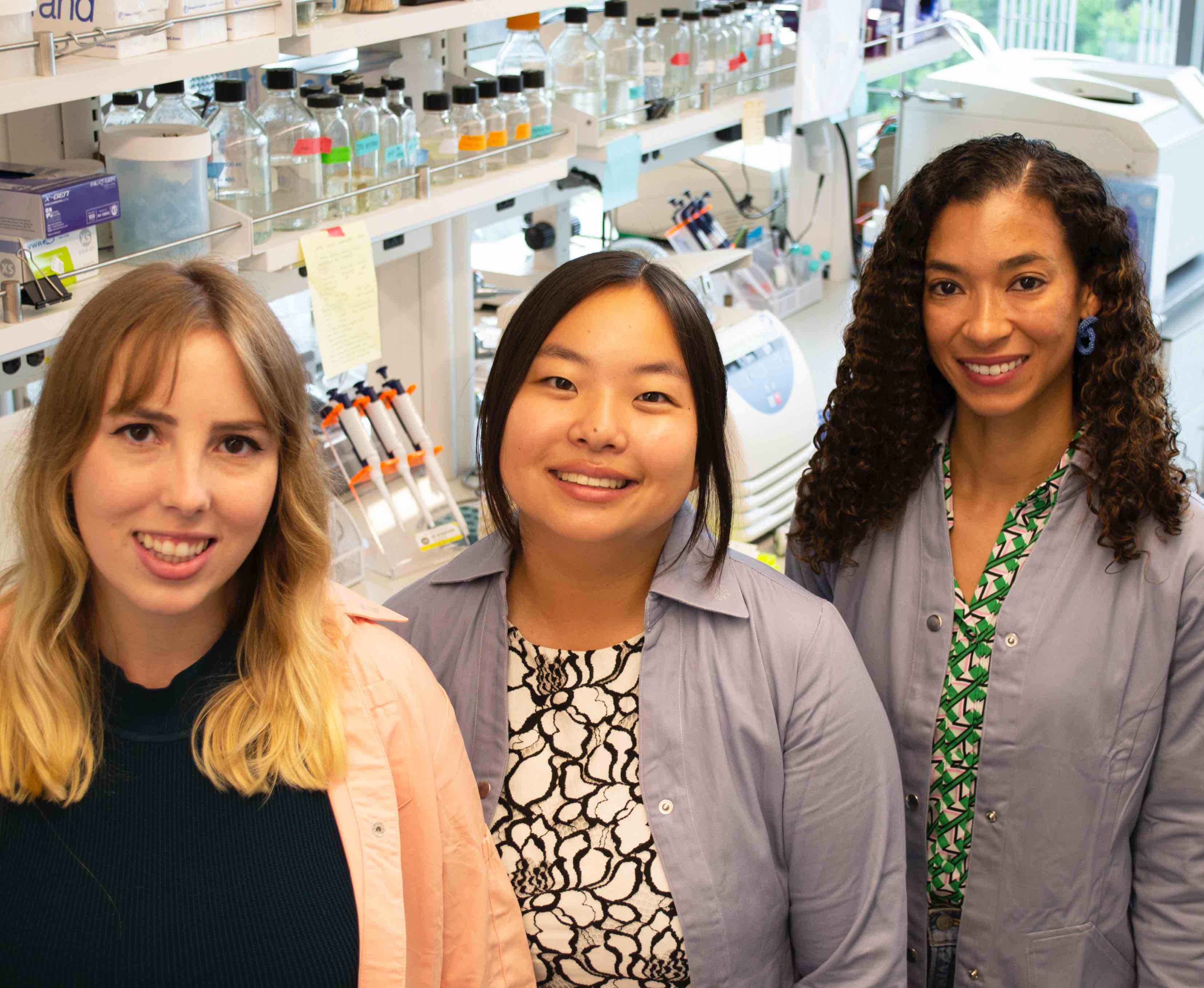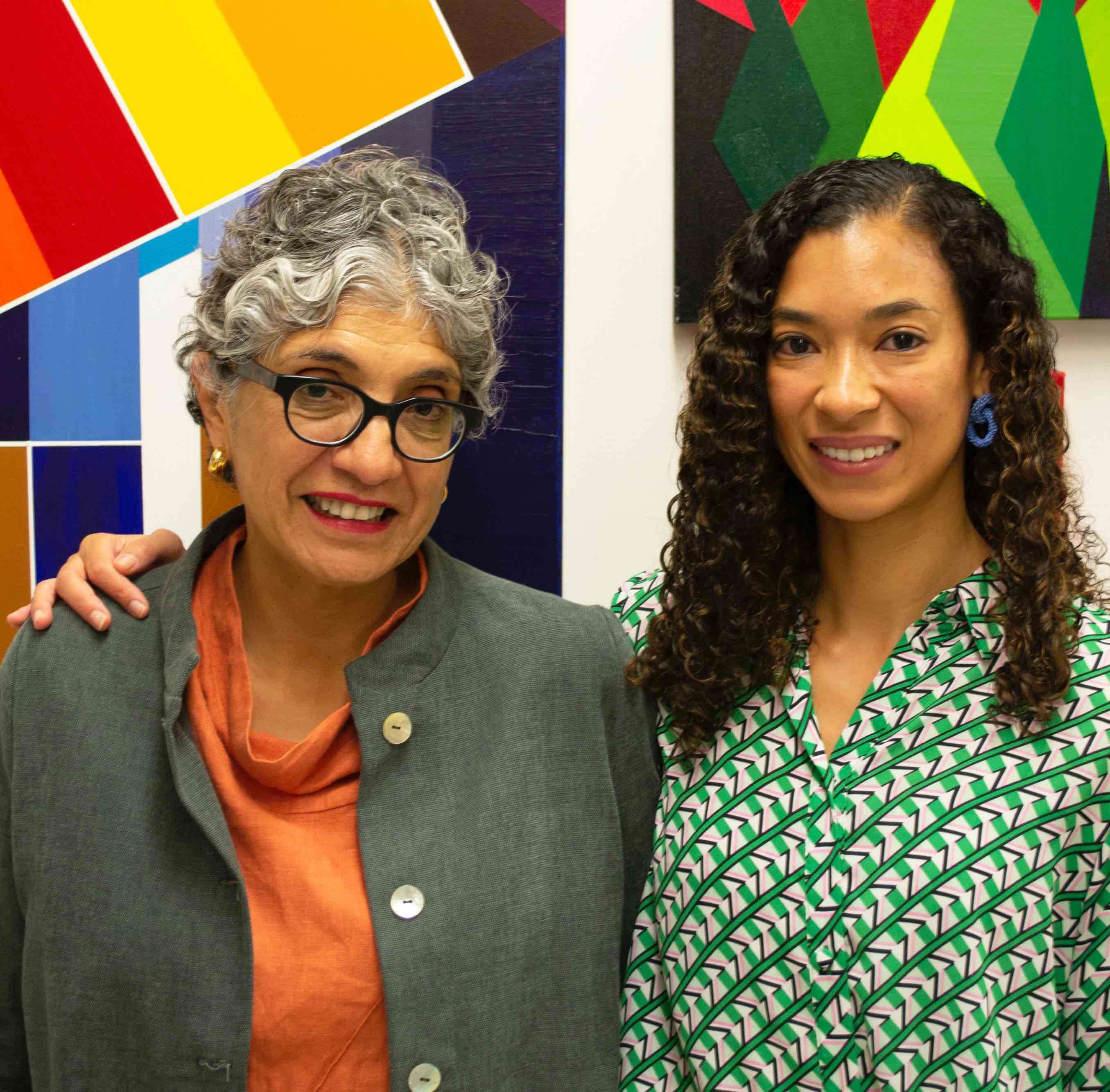Sonya Neal Receives New EDI Award from Chan Zuckerberg Initiative
Drawing from her personal experiences, Neal’s initiative opens unprecedented access to hands-on research and mentorship for underrepresented science students
November 3, 2022
By Mario Aguilera

Assistant Professor Sonya Neal (third from right) and Biological Sciences graduate students Tara Spencer (far right) and Sumedha Ravishankar (third from left) created the Biology Undergraduate and Master’s Mentorship Program, or BUMMP, to support underrepresented undergraduate and master’s students with a network of mentorship and resources.
As part of a new funding opportunity launched to promote equity, diversity and inclusion (EDI) in science, the Chan Zuckerberg Initiative (CZI), in collaboration with the National Academies of Sciences, Engineering and Medicine, has selected University of California San Diego Assistant Professor Sonya Neal as one of 25 grant recipients in the new program.
CZI created the Science Diversity Leadership (SDL) program to support the efforts of outstanding early- to mid-career researchers with a track record of promoting EDI in science through outreach, mentoring, teaching and leadership.
As one of the program’s first grantees, Neal will receive $1.15 million over five years to develop a new UC San Diego program that creates avenues of accessibility and inclusivity for underrepresented minority (URM) science students. The Jacobs School of Engineering’s Brian Aguado also received a CZI SDL award. The National Academies collaborated with CZI to administer SDL applications and convened experts to review applications.
“To increase diversity, equity and inclusion in the biomedical sciences, we must do everything possible to attract, retain and nurture top talent at our colleges and universities,” said National Academy of Sciences President Marcia McNutt, in the SDL program’s launch announcement.
Neal, a faculty member in the School of Biological Sciences’ Department of Cell and Developmental Biology, researches mechanisms related to misfolded proteins in cells and how organisms handle such potentially toxic threats. Under one line of research, her lab investigates a family of enzymes known as rhomboid proteases (Rhbd14) as a potential new target for triple-negative breast cancer, an aggressive disease that accounts for nearly 20% of all breast cancer types and disproportionately causes death in Black women. The research, which CZI is supporting, will be carried out by a diverse team of scientists including Postdoctoral Scholar Satarupa Bhaduri, graduate student Rachel Kandel, undergraduate student Jasmine Jung and Pharmacology Professor Joann Trejo, who is known for her groundbreaking studies on G protein-coupled receptors (GPCRs) and is a champion for diversity and inclusion efforts on the institutional and international scales.

Research under the CZI EDI award will be carried out by a diverse team of scientists including Assistant Professor Sonya Neal (right), Postdoctoral Scholar Satarupa Bhaduri (not pictured), graduate student Rachel Kandel (left), undergraduate student Jasmine Jung (center).
Neal designed the framework of her SDL proposal and other URM-focused programs at UC San Diego based on her own experiences as a Black female and first-generation college student.
In 2020, as uncertainties surrounding the COVID-19 pandemic rippled across academia, Neal and Biological Sciences graduate students Tara Spencer and Sumedha Ravishankar created the Biology Undergraduate and Master’s Mentorship Program, or BUMMP, with anonymous donor support. They designed their initiative to support underrepresented undergraduate and master’s students with a network of mentorship and resources. In the two years that followed, BUMMP quickly expanded and now features more than 500 underrepresented students matched with mentors.
Under the new CZI grant, Neal will build on the BUMMP program to provide URM science students with unique research and drug discovery opportunities as well as boost scientific literacy and accessibility, all under an umbrella of a supportive and inclusive environment. BUMMP will partner with UC San Diego’s Research Methodology Training Laboratory, which for more than 20 years has trained first-generation and underrepresented students for careers in biomedical and health sciences.
“The long-term goal for this grant from CZI is to serve URMs at an unprecedented scale,” said Neal. “This award sets the stage to demonstrate how important it is to have an academic setting where diversity thrives and a curriculum based in an equitable environment for underrepresented students.”
Neal will organize an annual eight-week hands-on research experience course with URM students recruited from BUMMP and San Diego community colleges. The training course will integrate research conducted in Neal’s laboratory with a curriculum in which students perform research on Rhbd14 and characterize promising anti-tumor drug candidates for triple-negative breast cancer. Such experiences will open opportunities on research papers, science presentations and connections with others in the scientific and industry communities.
“Through Assistant Professor Sonya Neal’s leadership and CZI’s valuable support, hundreds of students from underrepresented backgrounds will be able to participate in an immersive research experience in a nurturing environment,” said School of Biological Sciences Dean Kit Pogliano. “I cannot wait to see the positive ripple effects this new program will have on underrepresented students and the transformative impact they have in their future careers.”

Research funded under the new CZI grant will be carried out by a diverse team of scientists, including Pharmacology Professor Joann Trejo (left) and Biological Sciences Assistant Professor Sonya Neal.
In a separate announcement, Neal also was recently honored with a Faculty Mentorship Award, an honor bestowed by students from the Graduate and Professional Student Association. The students highlighted Neal’s efforts in creating a productive lab and healthy work environment, as well as her willingness to go above and beyond for trainees.
With the SDL program’s support, Neal’s goal is to accommodate more than 250 URM students with skills and connections in preparation for long-term retention and success in science.
“I am in academia today because of pipeline programs and dedicated mentors. My experiences illustrate that the efforts to increase the number of underrepresented minority students is not enough,” said Neal. Results from a recent BUMMP survey found that approximately 95 percent of BUMMP mentees indicated that their mentors empowered them to continue pursuing STEM careers. “Increasing this population must also be coupled to reforms that address a climate that exacerbates the subsequent loss of people from diverse backgrounds.”
Last year Neal also launched Social Issues in Biology, a new graduate class designed to prepare aspiring scientists in issues of ethics, equity, inclusion and social consciousness. The class, designed after a well-known course taught by Harvard Medical School Biologist Jon Beckwith, weaves EDI-themes into current education and training experiences.
CZI previously announced a $500 million investment over five years to support organizations leading the way to advance racial equity, diversity and inclusion. CZI funds also support Black, Latina/o/x, and Indigenous students who are pursuing STEM degrees at UC San Diego through the PATHways to STEM (PATHS) through Enhanced Access and Mentorship, a program started by Biological Sciences Professor Gentry Patrick.
“Too often, people of color employed as science faculty face additional burdens and expectations, including serving on committees unrelated to their scientific endeavors and performing extensive mentoring of Black and Brown students and trainees without compensation. This ‘diversity tax’ limits their time to focus on doing great science, yet these scientists are essential to advancing their fields and as role models and mentors,” said Dr. Hannah Valantine, a leading cardiologist, former National Institutes of Health Chief Officer for Scientific Workforce Diversity and CZI Senior Science Advisor, in the SDL launch announcement. “The STEM career path is an excellent avenue to opportunity, but entry requires mentoring that starts in pre-college education and continues into professional life.”
More information about the selected grantees of CZI’s Science Diversity Leadership program is available here.
- With information from the Chan Zuckerberg Initiative
